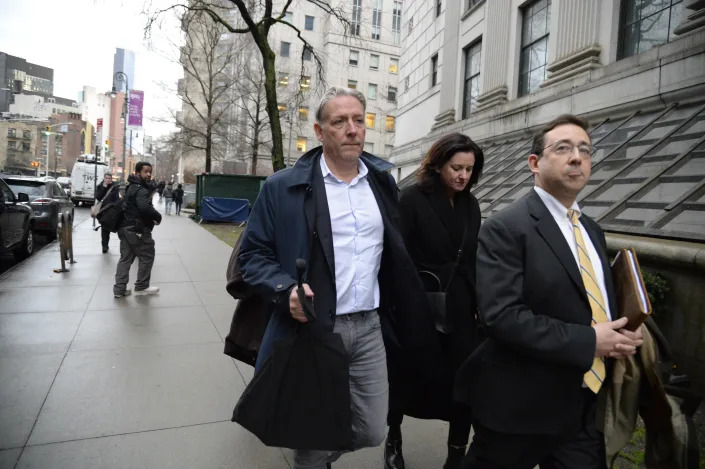
The FBI tried to recruit Oleg V. Deripaska, a Russian billionaire, as an informant around 2014, hoping he might shed light on organized crime and, later, possible interference in the presidential election.
A decade later, Deripaska may have turned the tables on the FBI: Prosecutors say the oligarch recruited one of the bureau’s top spy catchers, just as he entered retirement, to carry out work that they say violated U.S. sanctions.

The charges unsealed this week against Charles McGonigal — who ran the counterintelligence unit at the bureau’s New York field office and investigated Russian oligarchs, including Deripaska, according to the indictment — showed the extent of the oligarch’s reach into the highest levels of U.S. power.

There is no indication in the Manhattan indictment that McGonigal was working for Deripaska while still employed by the FBI. Still, the case — and a parallel indictment in Washington that charged McGonigal with receiving at least $225,000 in secret payments from a former employee of an Albanian intelligence service while still at the agency — has raised questions about how compromised he may have been.

Deripaska, an aluminum magnate, had been on the radar of U.S. authorities for years and remains under sanctions. He was known to be an ally of Russian President Vladimir Putin. The Treasury Department had reported he had ties to organized crime.
“Deripaska is a well-known man to anybody who follows Russia,” said Daniel Fried, a former U.S. ambassador to Poland and a former State Department official who helped craft sanctions against Russia. “I wouldn’t have accepted a luncheon invitation from the guy,” he added.
The implications of the allegations against McGonigal are alarming, Fried said. “In a broader sense, it does seem to suggest that the corrupting influence of the Russian oligarchs, the money, is real.”
In a statement, a spokesperson for Deripaska, Larisa Belyaeva, said that he did not hire McGonigal for any purpose and that he had never been close to Putin. A lawyer for McGonigal declined to comment.
For years, Deripaska, 55, has employed a small army of lobbyists, lawyers, consultants and fixers to protect his business and personal interests and smooth his access to Western countries.
In recent months, though, federal prosecutors in New York have charged several of those representatives in indictments that accuse them of a range of sanctions violations.
Deripaska was himself indicted last fall, with authorities saying he schemed to have his girlfriend give birth to their child in the United States. At the time, American authorities said he had not been arrested and was considered a fugitive.
Deripaska became rich by prevailing over rivals and partners in the 1990s, when well-connected Russians competed for control over state resources in the wake of the Soviet Union’s collapse. He earned a reputation for being ruthless and litigious.
He also made connections to powerful figures, particularly in Britain. He spent years trying to buy respect and credibility in the United States, London and elsewhere — hosting parties at the World Economic Forum in Davos, Switzerland, hiring former senior U.S. officials as lobbyists and courting powerful British political figures.
He had worked in the past with the U.S. government, including on a failed effort to rescue an FBI agent who had been captured in Iran, for which Deripaska spent as much as $25 million of his own money.
Still, successive administrations in Washington sought to limit his ability to travel to the United States, despite personal intercessions from Putin. The FBI searched multimillion-dollar homes linked to Deripaska in 2021 as part of the investigation into whether he had violated the sanctions imposed on him.
Deripaska came to broader public attention in the United States around the 2016 election, because he had employed Paul Manafort, Donald Trump’s onetime campaign chair, as an adviser.
From roughly 2014 to 2016, the FBI tried to court Deripaska as a potential informant, seeking information on Russian organized crime and on possible Russian aid to Trump’s campaign, The New York Times reported in 2018. At one point, the Times reported, agents appeared at Deripaska’s home in New York and pressed him about Manafort and whether he had served as a link between the Trump campaign and the Kremlin. (He told them the theory was “preposterous.”)
According to the indictment, in 2018, McGonigal reviewed a “then-classified list of oligarchs with close ties to the Kremlin” who were being considered for sanctions.
“Since at least 2016, Russia has been a central counterintelligence focus of the FBI and U.S. government,” said Brandon L. Van Grack, a lawyer in private practice who was a prosecutor for Robert Mueller’s investigation of Russia’s efforts to interfere in the 2016 presidential election. “This former agent was as acutely aware of that concern as anyone at the FBI.”
In April 2018, the Trump administration announced sanctions on seven oligarchs and companies they owned or controlled as punishment for Russia’s interference in the 2016 election, the 2014 annexation of Crimea and other acts.
Deripaska and his company, Rusal, were among them. In its announcement of the sanctions, U.S. Treasury officials cited Deripaska’s connections to a senior Russian official and his work in Russia’s energy sector. Authorities said he had been investigated for money laundering and had been accused of threatening business rivals, illegally wiretapping a government official and taking part in extortion and racketeering. They also cited allegations that Deripaska had bribed a government official, ordered the murder of a businessman and had links to Russian organized crime.
Deripaska denied the allegations, which his allies have said were punishment for refusing to cooperate with U.S. authorities. (In 2019, the Trump administration lifted sanctions against Deripaska’s companies under an agreement intended to reduce his control and ownership, though a confidential document showed the deal may have been less punitive than advertised.)
For Deripaska, the sanctions represented not just an existential threat to his business, but a rejection of the cosmopolitan power broker image he had long sought to project in the West.
Deripaska fought back, seeking to undo the sanctions or lessen their potentially lethal effect on his businesses. The Times reported in late 2018 that a secret lobbying effort by his team of lawyers, consultants, bankers and well-connected allies had made “substantial headway,” including winning postponements on the sanctions.
“One of the risks and hazards of sanctioning wealthy people is they are better positioned to fight back,” said Carlton Greene, a sanctions and international money laundering expert.
It is not clear from the indictment how McGonigal got onto Deripaska’s radar.
According to the indictment against McGonigal, while he was still working for the bureau in 2018, Sergey Shestakov — a former Soviet and Russian diplomat and translator who was also charged in the case — introduced McGonigal by email to an employee of Deripaska. That person was identified in the charges as Agent-1 and described as a former Soviet and Russian Federation diplomat.
Shestakov asked McGonigal to help Agent-1’s daughter, a college student, get an internship with the New York Police Department in counterterrorism, intelligence gathering or “international liaisoning,” according to the indictment. McGonigal told an FBI subordinate that he wanted to recruit Agent-1, whom he described as a Russian intelligence officer, the indictment says.
The indictment says McGonigal agreed to help the daughter, and with help from a contact at the Police Department he secured a meeting for her with a police sergeant.
In 2019, after his retirement, McGonigal introduced Deripaska’s agent to an international law firm in Manhattan to help Deripaska have the sanctions removed, according to the indictment. During the negotiations, McGonigal met with Deripaska in London and Vienna, prosecutors said. When Deripaska signed with the firm, it brought on McGonigal as a consultant and investigator.
In the spring of 2021, Agent-1 began negotiating with McGonigal to work directly for Deripaska, without the law firm. He wanted McGonigal to investigate a business rival, according to the indictment.
Between August and November 2021, prosecutors say, Deripaska made payments to Shestakov and McGonigal from a Russian bank through accounts in Cyprus and New Jersey. In October of that year, FBI agents searched homes linked to Deripaska in New York City and Washington.
On Nov. 21, 2021, FBI agents seized Shestakov’s and McGonigal’s electronic devices.
Credit: Yahoo News
